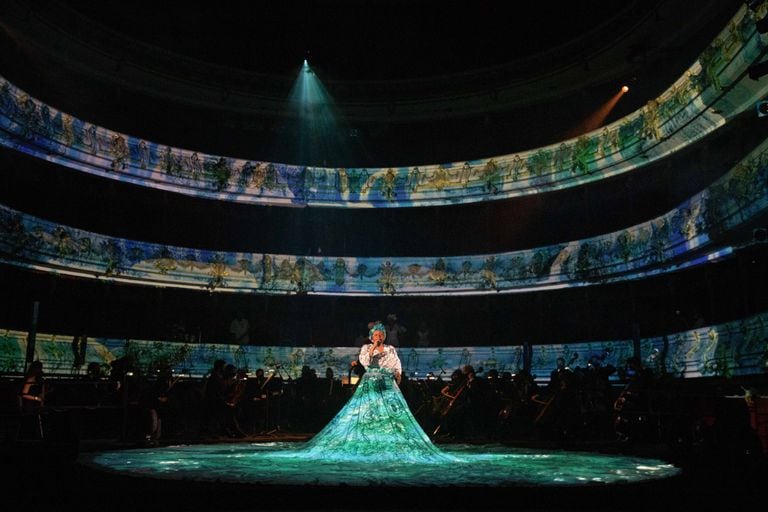The singer Zully Murillo inaugurated the Petronio Álvarez Festival, in Cali.Courtesy Petronio Álvarez Festival / Courtesy Petronio Álvarez Festival
"My heart was
broken
in two because you know that Petronius is
boronbonbón
and we were in
birinbinbin
because they had told us that the festival was not going, but it is going!"
Thus, with invented words that recall that African tradition transformed and enriched in the Colombian Pacific, the Afro influencer, Kathe Ortíz, presented the new reality for one of the most important Afro festivals in Latin America, the Petronio Álvarez.
The translation is simple: thousands of people were discouraged because the Afro music gathering they wait for so much every year was suspended due to the coronavirus.
However, its organizers decided to make it virtual despite the fact that El Petronio is a meeting of bodies around ancestral dance, marimbas music and cununos (percussion instrument) and gathers around 300,000 people each year in Cali.
“We are not going to hold
back
, we are not going to do drama because the important thing is that it goes.
With the television on, with the sound system, with the body on and let the
borondo
(the party) form ”, the woman continued when she invited Petronius, which ends this Sunday.
The Festival has undoubtedly been very different from its previous versions.
To the traditional colored turbans, the fashion that is shown every year at the event, were added the colorful masks of the presenters and musicians who lead the festival through social networks and the local channel Telepacífico.
Without crowds, still prohibited in the city, the people of Cali have had to continue dancing in the halls of their homes with the traditional white scarves that characterize this festival.
But it has also given way to majestic performances such as that of the singer and narrator, Zully Murillo with the Cali Philharmonic Orchestra.
A nostalgic show that allowed us to listen to the most traditional songs of the culture of Chocó, Buenaventura, Valle del Cauca and Nariño, where the Afro-Colombian population is concentrated in Colombia.
Recognized groups have emerged from Petronio Álvarez in the country and on international stages such as ChocQuibtown, Herencia de Timbiquí or Grupo Bahía, to name a few.
And every year it becomes the space for new sounds and trends to be presented in Afro music and fashion.
This, in addition to being virtual, entered into an alliance with other pan-African festivals thinking of facilitating the circulation of artists and the musical creation that connects the Pacific with the African heritage.
Seeking to find the sounds of the diaspora, they invited musicians from Brazil, the United Kingdom, Tanzania and Colombia to talk about innovations and emerging Afro music and created an International Gathering of Pan-African Festivals, with the founders of festivals from Ghana, Zanzibar and Salvador. of Bahia.
"The idea is that they come together and inspire each other, they can think of musical co-creations, of sound mixes without losing their roots," says Luis González, Arts Manager of the British Council, ally of Petronio Álvarez and creator of the Festival's Academic agenda.
Fashion, which is another of the Petronio axes, has also been present through international meetings.
"We seek to position Afro designers," he explains.
Thus they brought together Gloria Wavamunno, Ugandan and founder of Kampala Fashion Week;
Mikael Calandra, founder of Crudo Volta, a visual project that documents the development of contemporary musical scenes of the African diaspora;
the Brazilian activist and designer, Carol Barreto;
and the Colombian Lía Samantha, a pioneer of Afro-Colombian fashion.
While the food, which is the heart of the Festival, moved to the screens of social networks, where midwives and grandmothers became chefs who taught live how to make their traditional ancestral dishes and the secrets to cook on nights of full moon or prepare the viche, their traditional drink to cure the evil eye or to dismiss the dead.
Everything, amid the sounds of the chonta marimba, which gives the traditional sound to the festivities of the Colombian Pacific.

